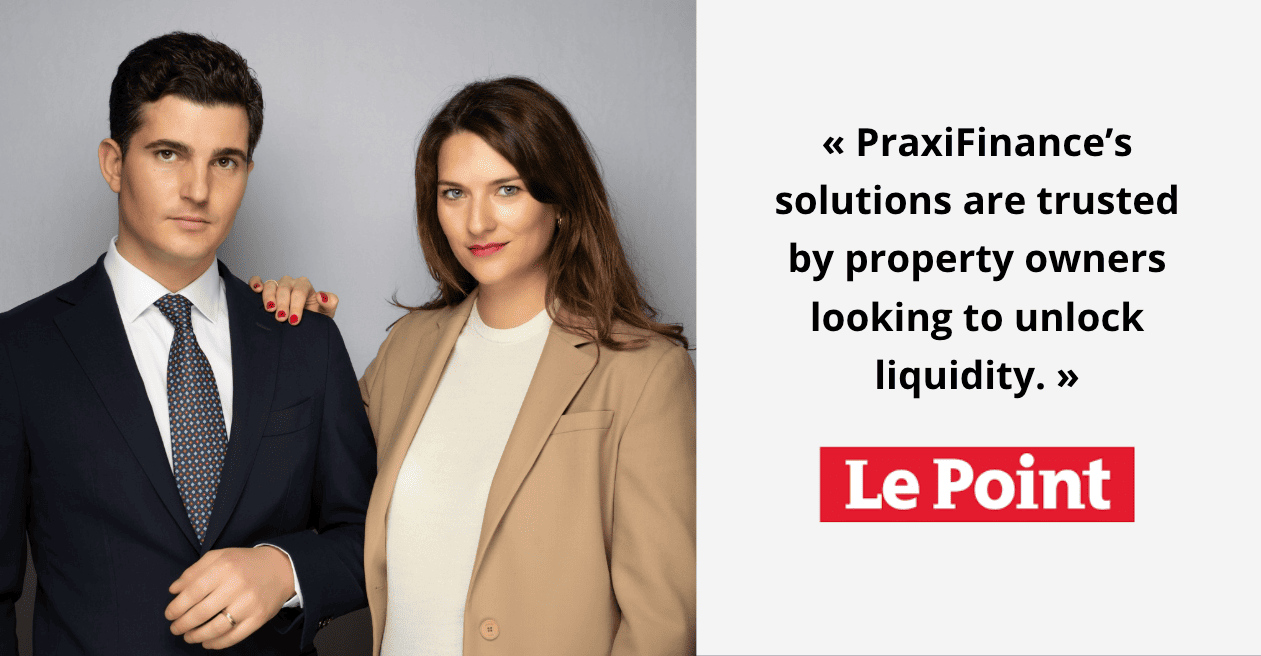Learn how equity release in France helps homeowners and expatriates unlock liquidity safely under French notarial supervision. Owning property in France often means long-term stability — but for many retirees and expatriates, wealth remains locked inside the home. The lifetime mortgage, called prêt viager hypothécaire, transforms part of that value into tax-free capital while you stay in your home for life. PraxiFinance, operating since 1990 from offices in Paris and Nice, has handled thousands of regulated equity-release transactions, visiting clients throughout France and ensuring that every operation remains transparent, bilingual and fully protected by law.
What is a lifetime mortgage
A lifetime mortgage is a long-term loan secured on your property. You remain the full legal owner, continue to live there, and make no monthly repayments. Interest is rolled up annually (capitalised) and repaid from the future sale proceeds — typically after death or when you move into permanent care. Unlike a sale or downgrading transaction, this model maintains ownership and residence rights. It is the only equity-release structure authorised in France for seniors who wish to access cash safely under consumer-credit and mortgage legislation.
Who qualifies
- Applicants aged 60 or above (all co-owners).
- Main or secondary residence located in France.
- Property value generally €400 000 +.
- Little or no existing mortgage.
- Heirs informed and protected by the notarial process.
PraxiFinance conducts an eligibility review in 48 hours and provides a bilingual simulation before any commitment.
The process step by step
- Eligibility confirmation – age, property and title verified.
- Independent valuation – certified valuer assesses market price.
- Loan proposal – PraxiFinance models a conservative amount (20–50 %).
- Notarial drafting – the notary prepares and authenticates the deed.
- Funds release – payment via the notary’s escrow within 24 hours of signature.
Every file follows the same safeguards defined by safe equity release in France.
Example calculation
Below is your single comparative table — ready to paste exactly as shown.
This example shows how a homeowner with an €800 000 property could receive €320 000 tax-free today. After ten years, the rolled-up balance reaches approximately €500 000, leaving €300 000 of equity for heirs if the property appreciates modestly.
Advantages of a lifetime mortgage
- Immediate, tax-free cash while keeping your home.
- No monthly repayments or income-ratio tests.
- Fixed interest for life — total visibility from day one.
- Freedom of use — renovation, family gifts, or healthcare.
- Inheritance planning — structure donations early while retaining occupancy.
- Strong legal protection under French notarial control.
For younger or working borrowers seeking shorter-term leverage, the mortgage-backed loan in France offers an alternative with repayments and higher ratios.
Risks and mitigation
- Compound interest reduces final inheritance value.
- → Mitigation : optional inheritance-protection clause or partial drawdown facility.
- Early repayment fees if settled before three years.
- → Mitigation : PraxiFinance negotiates flexible clauses for partial repayments after three years.
- Valuation and notary fees (≈ 1.5–2 %) deducted directly from proceeds.
Clear modelling avoids surprises and ensures long-term family harmony.
French legal protection
Every deed passes through a notaire who:
- verifies ownership and capacity;
- drafts and registers the mortgage;
- ensures heirs’ rights are preserved;
- holds funds in escrow until registration.
French law forbids any transfer of ownership before death or voluntary sale. Heirs can either repay and keep the property or sell and recover any surplus. The “no negative equity guarantee” ensures they never owe beyond sale value. These safeguards form the backbone of equity release regulations in France.
Tax and inheritance
Funds received are not taxable income. They are classified as a loan. Interest may be deductible if used for rental or professional improvements. Upon death, the mortgage is cleared from sale proceeds, and all remaining equity passes entirely to heirs. PraxiFinance provides bilingual statements so families abroad understand their position clearly.
Example case study
A 72-year-old retiree owns a property near Antibes valued at €1 million. She releases €400 000 at 4.6 % fixed. After twelve years, total owed ≈ €650 000; property value ≈ €1.2 million. Her heirs choose to sell, repay the balance, and keep €550 000. The entire transaction — valuation, mortgage, repayment — is handled by the same notary for absolute transparency.

Why choose PraxiFinance
- 35 years of experience in equity-release structuring.
- Certified national network of notaries and partner banks.
- Bilingual experts assisting UK, US and EU clients.
- Fast, transparent eligibility decisions within 48 hours.
- On-site meetings anywhere in France.
- No hidden costs; detailed offer before signature.
PraxiFinance’s mission is not only to secure funds but to protect families. Each case is built around inheritance planning, tax neutrality and lifetime comfort.
Integrating into your estate plan
A lifetime mortgage can finance donations anticipées (early gifts) or home upgrades while maintaining control. Working with your notary, PraxiFinance aligns the operation with existing wills or succession strategies. All information is logged in the national notarial database for permanent traceability.
Common misconceptions
- “I’ll lose my house.” – False. You remain full owner; only a lien is registered.
- “My children will owe debt.” – Impossible. They cannot owe more than sale value.
- “Interest is unpredictable.” – It’s fixed, disclosed, and modelled from day one.
- “It’s only for the wealthy.” – Any property above €400 000 qualifies under the same law.
Education and clear advice are the strongest protections for seniors and their families.
FAQ – Lifetime Mortgage France
Who can apply?
Any homeowner aged 60 + with property worth ≥ €400 000 in France.
Do I still own my home?
Yes — ownership never changes; the mortgage is only a registered security.
Can foreign owners apply?
Yes. PraxiFinance assists British, American and European expatriates with French properties.
How is interest calculated?
It compounds annually and is repaid from sale proceeds.
Can I move home later?
Yes — subject to valuation, the loan can transfer to the new property.
Can I repay early?
Yes — after three years, full or partial repayment may occur without penalty.
Will my heirs owe money?
No — the “No Negative Equity Guarantee” caps repayment at sale value.
How fast is the process?
On average 8–10 weeks from approval to funds release.
Where can I learn about alternatives?
Compare with the mortgage-backed loan in France or the sale with deferred price simulator for temporary funding models.



.png)


.svg)






